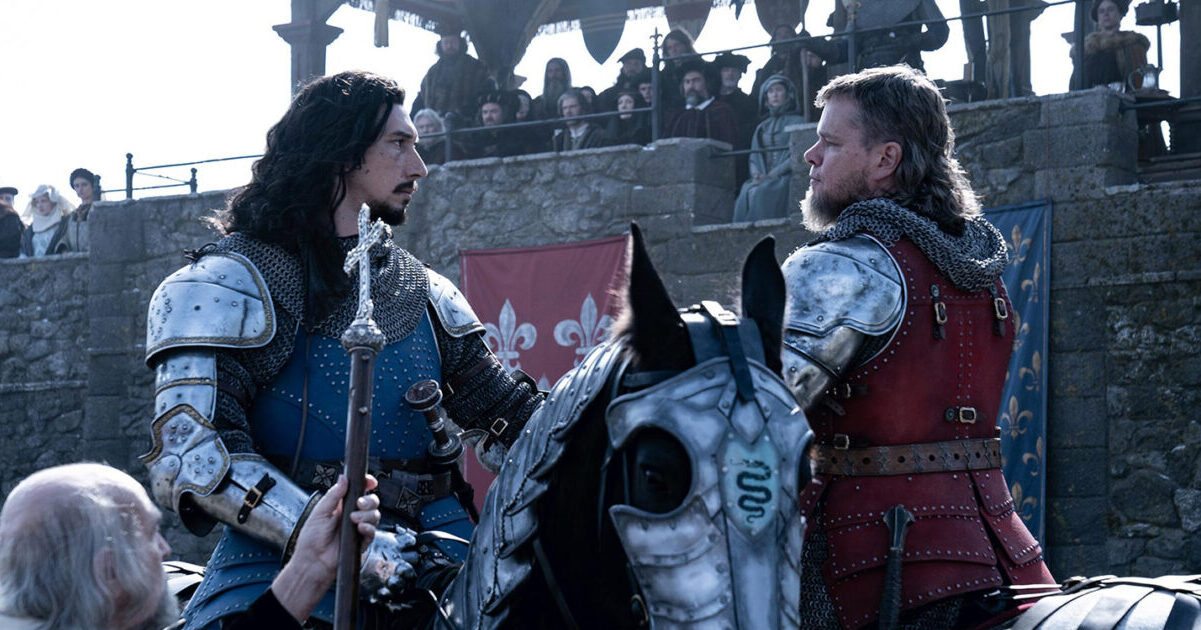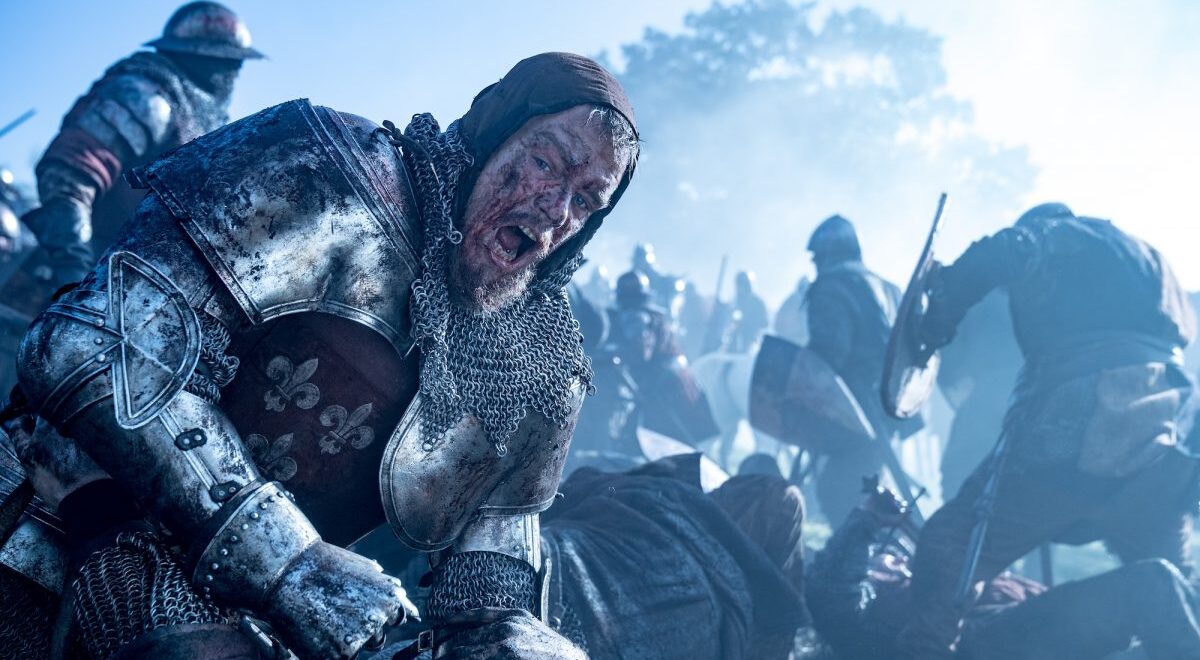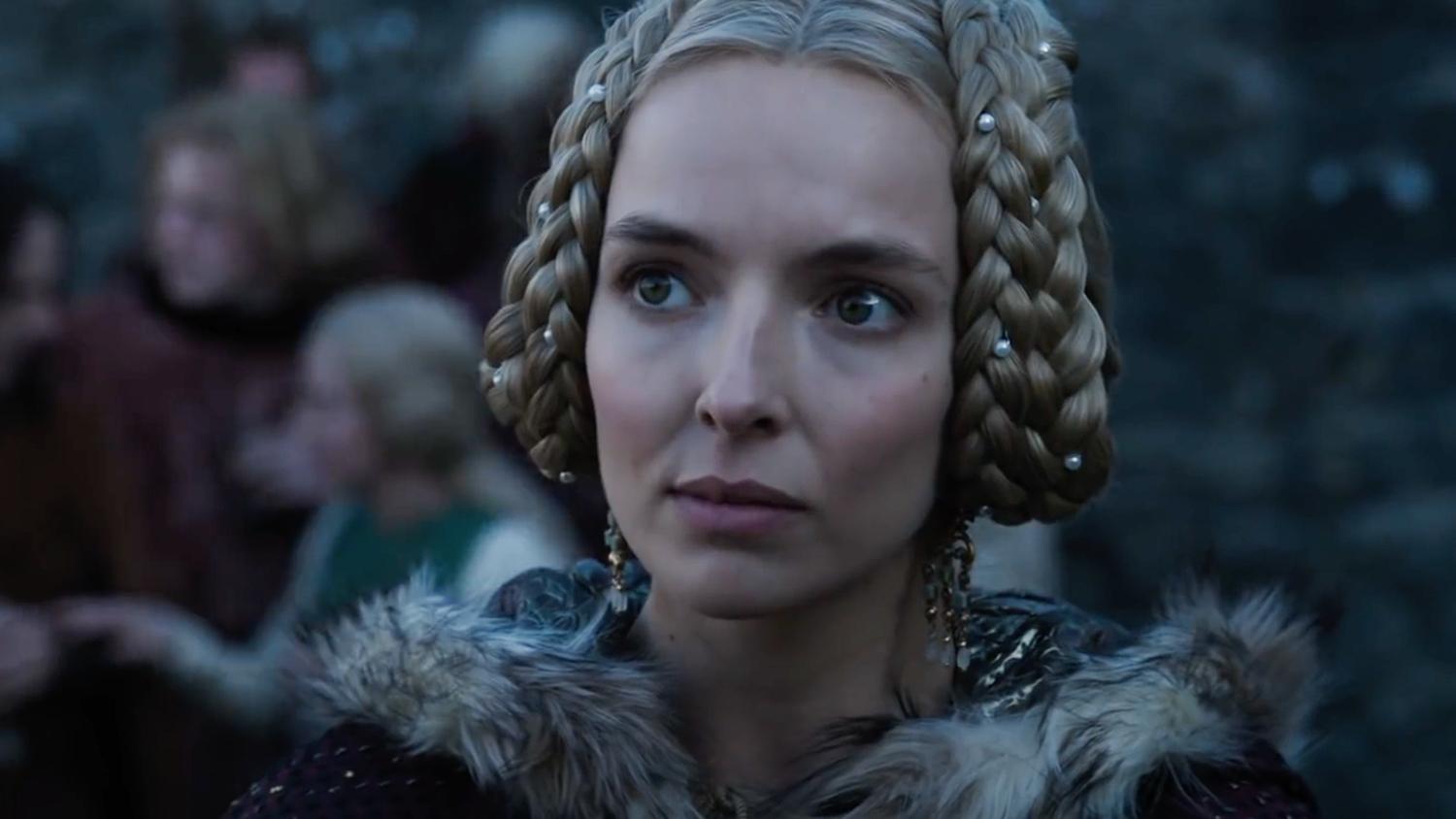
Ridley Scott helped to usher in a new era of entertainment with Gladiator. After it’s mainstream and awards success (taking home five Oscars including Best Picture) it seems like our screens were bombarded with films and television series trying to capture the same audience. From Lord of the Rings to The 300 to Game of Thrones if you were looking for tales of knights, swords, armor and hand to hand combat, there was surely no shortage. Now 21 years laters Scott revisits the days of chain mail and swordplay, this time about ten centuries in the future with The Last Duel, based on the Eric Jager novel.
The film is based off real events that took place in the 12th century, but the themes transform it as a very fitting modern day #MeToo tale. Told in three chapters the film requires some patiences, revealing its story like a puzzle whose pieces are being added one by one. For those unfamiliar with the source material it takes a little while before the core of the film is exposed. Some moments only become clearer as more of the pieces are later filled in. What makes the storytelling so fuzzy is the approach taken – similar to Kurosawa’s masterpiece Rashomon. Each chapter is a unique perspective on the same events. The perspectives are those of knight Jean de Carrouges (Matt Damon), his friend and squire Jacques Le Gris (Adam Driver) and Marguerite de Carrouges (Jodie Comer.)

Marguerite claims to have been raped by Le Gris, an accusation that leads to a duel to the death between the one time best friends. With each chapter not only are the events slowly revealed but also the individual truths they know. Ridley asks a lot of the audience but delivers. It starts with Jean who even in his own story frames himself as a victim, a often whiny man who seems to always get the shaft. Le Gris is a handsome and popular man who sees no wrong in his actions. Marguerite is a strong woman who tolerates and tries to respect her husband, showing much more substance and mettle than either of the men.
The perspectives of each chapter alters the reading on the events – with the same moments playing differently depending on whose point of view it is told from. The three takes on the events are told using many of the same camera angles and even using identical dialogue but with the subtle differences that shift how it is read. A glance becomes a gaze, a pair of shoes slipped off flirtatiously become a sign of something much more sinister.
The results are riveting and brutal – both the battle scene and the treatment of Marguerite. Ridley’s creative decisions are at the very least questionable in the portrayal of the rape. He fixes the camera leaving the audience uncomfortable and helpless to do anything. Worse, he mercilessly puts us and Marguerite through it twice. While indicating misogyny some of the messages become conflicting and muddled in the process.
The screenplay was adapted by Nicole Holofcener, Ben Affleck, and Matt Damon, each who wrote from an individual’s chapter from their perspective. The film is also the first time Damon and Affleck paired up since their Oscar-winning screenplay for Goodwill Hunting, 24 years ago. The screenplay delivers much more than a flat tale of misogyny – it also entails misdirected lust, damaged pride, and bravery. The characters are well developed and our allegiances shift as we learn more about them. At first I was torn with whom I was rooting for before shifting to which I detested less. It is a he-said, she-said, I-said story – with Damon’s Jean being the I-said, focused more on himself than anyone else.
For the role Damon uglies himself up, sporting a nasty scar, a mullet and grimace for most of his screen time. The more time you spend with him the less you want to. Driver fares better, at least at first, with some charm and a forgivable smugness. All that is out the window once accused of the unforgivable. Comer fairs best, in a spectacular performance hides her strong willed beneath and unassumingly delicate exterior. While sidelined for much of the opening half, she shines above all. Anyone who has seen her work in Killing Eve will not be surprised how much heart and soul she puts into the role. The other highlight is Ben Affleck as the debauchery a driven slimeball. Pierre d’Alençon. He hams it up to perfection turning what should be an unlikeable character into a scene stealer you want to hate – it is the type of roll he needs to tap into more often. Sure, the accents are across the board a bit all over the place, but it almost feels fitting with the contemporary beats in the screenplay and message.
Skillful editing by Claire Simpson squeezes more energy into the story than initially expected. If told in a linear fashion, I really doubt it would have worked half as well. The action of the battle scenes can actually be followed, because Simpson avoids over cutting into the convoluted mess you often find. This retains the raw savagery of the battlefield, with each bone-crunching, flesh-piercing swing of the blade felt. The costumes are exquisite and detailed. The hairstyle range from a selection of gorgeous braids and intricate styles on Comer and Adam Driver’s always flawless flowing locks, to the oddly-fitting bleached blonde Affleck and Damon’s seemingly do-it-yourself-with-a-dull-kitchen-knife coif complete with matching mullet. The looks are all memorable, not 100% sure if for the right reasons.
Dariusz Wolski cinematography combined with the vibrant sound design add a true texture to the film. Many of the interiors use the warm light cast from the fireplace to gently light the characters while also adding a natural soundtrack of a crackling wood fire to the scene. On the battlefield it is a cacophony pounding metal, clinging swords, splattering blood and breaking bones. The battles are loud and violent while Wolski’s camera draws you in so close you can almost feel the brutality. This is especially true in the final battle, a joust to the death between the two disputing friends. It is as intense as they come and had me holding my breath through every stab, crack and thud. The stakes are built up in an unexpected way, keeping me invested and at the edge of my seat – all only reinforced by Harry Gregson-Williams’ pounding score.
The Last Duel does a lot right, and overcomes its missteps to deliver a captivating morality tale and character study. The film is both reminiscent of medieval tales of old complete with jousting, while also feeling eerily contemporary and relevant. While Scott does not shy away from tackling the complex issues, he is not always completely successful in his attempt. Telling this in three chapters does keep the two male leads longer than it feels necessary, but as it shifts to Marguerite it all comes together. There is more substance than you may expect. The fight scenes are graphic and fierce, but it is the thought-provoking aspects that resonate. That may be a tough sell to the masses who just want sword fights, but even they should leave satisfied. There is a lot to unpack and will hopefully continue to feed conversations that were long overdue.
Quick Scan:
Not without its flaws, Ridley Scott’s The Last Duel delivers intense actions, strong performances and timely, though-provoking subject matter in a riveting and often brutal fashion.



